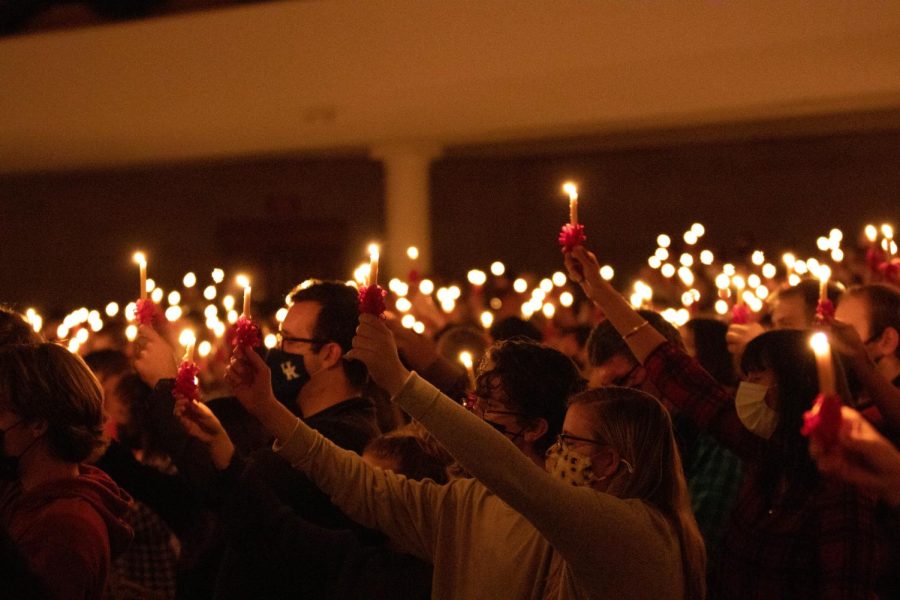Conversation considers a higher power
Students approach the question of whether there is an omnipotent being who created humanity
January 28, 2022
Maryam Khanum: Well, Robert, it looks like we’re tackling an age-old question here. The existence of God has been the subject of countless arguments, triggered numerous wars and created a number of divisions in modern society. I wonder if anyone can really say that God exists beyond doubt.
Robert Yount: You’re right, Maryam; it’s a question that has been a topic of fierce debate for thousands of years. When observing our world, at first, it seems that proving the existence of God cannot be fully achieved. First impressions, however, are incomplete; as we delve into our observations, we are able to come to the conclusion that the existence of God radiates through every aspect of our being. This is evident in our curiosity about God and the observable world itself, as well as our inherent human morality.
MK: That’s a fair point, Robert. It definitely seems like the observable world had to have been shaped or designed a certain way by an omnipotent designer. However, as Bertrand Russell points out, the burden of proof lies with the individual that asserts the claim. He argued that there could be a teapot floating in space between Earth and Mars — small enough to evade observation from any telescope or human technology — but it would nonetheless still be there because the fact is that its existence cannot be proven or disproven. The existence of many things cannot be proven or disproven, so what justifies our belief in an omniscient, omnipotent, moral higher being?
RY: I almost forgot about Russell’s Teapot; it’s definitely an interesting rhetoric that encourages discourse. A teapot is a minuscule and singular physical object that can be verified, hardly having an effect on Earth, Mars or even the universe itself, while God remains as something much more profound. This leads into the first part of my assertion that God exists due to our curiosity about the possibility of a higher power, along with our ideas. This has been a continuous conversation throughout history — whether an omniscient, omnipotent and moral supreme being created the universe and everything in it. By any account, that should be an insane idea. However, when one looks at other species besides humans, there is not a single animal that believes in a higher power. Are there rituals in nature? Absolutely. Elephants are known to bury their dead with mud and foliage. But they don’t pray at these gatherings, or worship with other animals such as birds. This pervasive idea of God is exclusive to human beings. Where could it have originated? There seems to be a Creator that the creation seeks to “know”.
MK: The fact that so many people not only collectively believe in, but worship and create traditions surrounding this kind of higher being is definitely striking and may allude to the existence of God. However, human beings are prone to being wrong. At one point, we all believed the Earth was flat until it was proven to be otherwise. Is the existence of God really something that can be proven in the same way?
That leads me to my main rebuttal towards your argument: human beings have historically sought meaning and explanation. We can answer many things, but the causes and reasons behind our existence have remained a mystery to us. A higher being seems to be the best explanation for this, but we have never been able to prove it. I would argue that the inability of other species to perceive or acknowledge the existence of a higher power supports this point, as this search or this “knowing” isn’t inherent to all creations.
RY: That is a completely fair rebuttal. Other species cannot perceive or acknowledge the existence of a higher power, we are both in agreement on that. This itself already separates humans from other species, removing the ability to fully consider us on the same level as nature — despite our deep flaws. In this case, the observable world presents us with tangible items such as thousands of languages, advanced technology such as iPhones, political ideologies, a love for one’s country — or the desire to move elsewhere — the likes of which cannot be seen on the same level in the rest of nature. Humanity went to the stars, bringing animals along; our complexities raise humans above all other species to have dominion over this world. Now, that’s not to say such a dominion permits us to animal cruelty; in justifying animal cruelty, we put ourselves on a more “beastly” level.
You mentioned past ideas about our world. We knew for sure the Earth was flat, until it wasn’t. We knew for sure we were the center of the universe, until we weren’t. Science proved that the Earth was spherical and that the universe isn’t geocentric. Science itself is based on observation — observations such as fundamental differences between humanity and animals and is governed by laws that seem almost too perfect to be true. How has the universe not collapsed in on itself, and how did Earth turn out to be the perfect “Goldilocks” region for people like you and me? There appears to be a being that has created those laws, and understood that you and I have something to give to this world.
This brings me to my final point about an inherent morality that we all possess, which may be a surprise to some of us. There are a set of innate principles which are “right”. As discussed before, animal cruelty cannot be justified. Why? You said before that human beings are all prone to being wrong. I can’t argue with that statement. We are often too quick to define what is right and what is wrong. While there are flawed moralities and leaders who knew for sure that their genocide was “justified,” we still recognize that oppression exists, and it’s our job to help our neighbor who is in need. Oppression can’t be wrong unless morality is objective. There must be someone behind these principles. Science is also the pursuit of truth, a truth set in place by a Creator.
MK: The anthropic principle is definitely something that seemingly points towards the existence of some kind of higher power that created life. However, it could also be argued that the Earth wasn’t created to fit us — we evolved to fit its preexisting conditions. Even upon the earth there are places which are not habitable for us, such as the depths of the ocean in the Mariana Trench. However, there is still life there, as life has evolved and adapted to be able to exist there. This could indicate the development of life in a certain environment that occurred through evolution and not necessarily through intelligent design.
I would argue that objective morality doesn’t actually exist. There can be things that a large majority of people agree on, but they cannot necessarily be factual. You and I can agree that genocide and oppression are morally wrong, yet there have still historically been people — and leaders — who have not shared our views. When we advance further into the more nuanced discussions surrounding morality, these disagreements are much more frequent — debates surrounding the morality of things like abortion, the death penalty or various economic systems are extremely frequent. Hence, we can’t really be sure that a higher being created an objective morality for us to discover either.
Even if such a higher being does exist, we cannot know that our assumptions about them — that they are omnipotent, omniscient and moral — are all correct. As physicist Bobby Henderson pointed out when he created Pastafarianism, we really have no idea what this higher power would be or could look like — for all we know, it could be a giant Flying Spaghetti Monster that wants us to wear pirate costumes on Thursdays as a way of worship.
RY: Well Maryam, I think we approached a sensitive topic that people often hesitate to discuss with proper decorum. Thank you for discussing this with me.
MK: I agree, thank you for having this thought-provoking conversation with me.

















